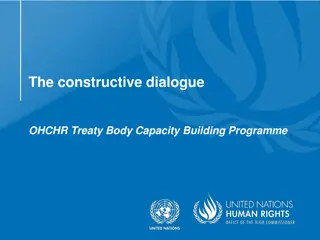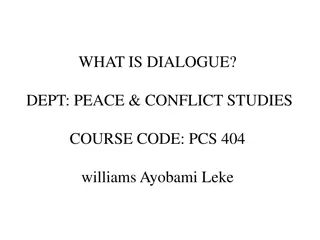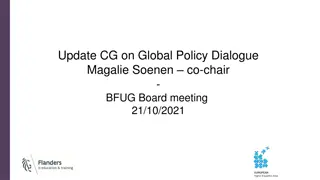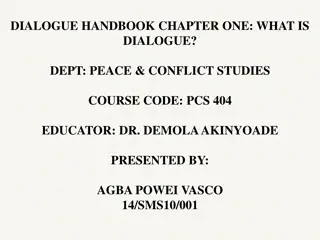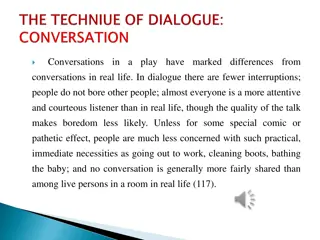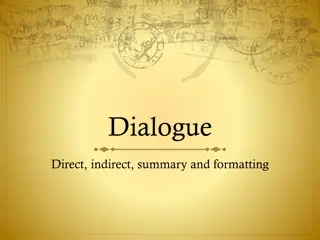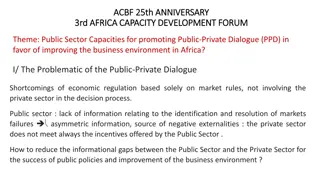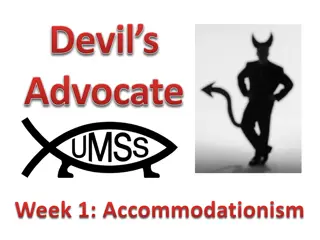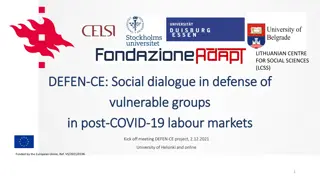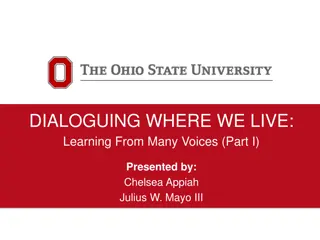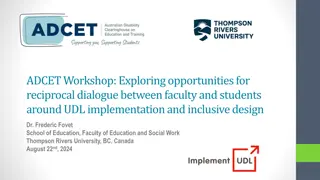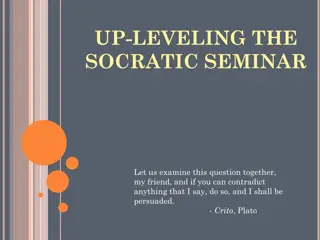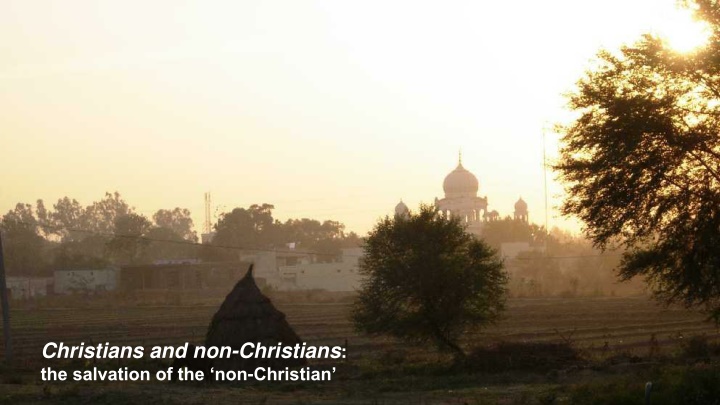
The Salvation of Non-Christians in Catholic Theology
Explore the theological perspectives on the salvation of non-Christians, the relationship between Christians and non-Christians, and the discernment of a hospitable Catholic sensibility in engaging with people of different faiths. Vatican II's insights on the Church's engagement with other faiths are also highlighted.
Uploaded on | 2 Views
Download Presentation

Please find below an Image/Link to download the presentation.
The content on the website is provided AS IS for your information and personal use only. It may not be sold, licensed, or shared on other websites without obtaining consent from the author. If you encounter any issues during the download, it is possible that the publisher has removed the file from their server.
You are allowed to download the files provided on this website for personal or commercial use, subject to the condition that they are used lawfully. All files are the property of their respective owners.
The content on the website is provided AS IS for your information and personal use only. It may not be sold, licensed, or shared on other websites without obtaining consent from the author.
E N D
Presentation Transcript
Christians and non-Christians: the salvation of the non-Christian
Naming Non-Christians In pre-Vat 2 period - theologians spoke of non-Christians as if generic category defined in terms of what they are NOT. (NB tendency still there even in title of Nostra Aetate.) Insofar as made any impact on life of Church, non-Christians considered under theological heading of Quaestiones Disputatae ; IE questions for legitimate debate, usually under theological category of salvation. Can the non-Christian be saved? In biblical tradition that formed Christianity, theme of salvation cannot be separated from creation. God creates and recreates by entering into God s creation, restoring unity that is God by gathering scattered People together into One unity understood by Catholic Christians as the Body of Christ. What then is to be said about those outside that Body? What is relationship between Christians and non-Christians, Church and non-Church? Are they to be incorporated too? If so, when and how? And how to avoid speaking as if humankind is simply divided into separate categories, Us and Them ? Scriptural witness broader than narrative of salvation of one particular people. All peoples addressed by single yet differentiated blessing; rather what is revealed is universal scope of God s providential purposes, divine will-to-save . God has other peoples . Cultural-social shift in way we talk about them , with more attention being given to self- designation, names people give themselves. EG category like Hinduism much more heterogeneous than we realise. Other people also persons of faith with names.
Discerning a Hospitable Catholic Sensibility Catholic instinct seeks out furthest extent of divine grace; hence a strong emphasis on listening to Word and attending to sacramental practices which together build up wholeness of Divine Revelation; no fundamental distinction between Book of Nature and Book of Scripture ; BUT danger of naively ignoring reality of human sinfulness, tendency to substitute short-term interests for God s sovereignty, to make premature judgements about what is strictly other . Sin always born from tendency to over-reach ourselves, to move beyond the level of what can be said. What is the privilege of Christian faith? And how can it be spoken about? Plausible to claim broad and generous reading of signs or traces of grace manifested in nature and history; thus constructing versions of a cosmic religion as a pre-history continuous with God s gracious action revealed in Bible. BUT any natural or lawful religion - what may legitimately be discerned as a seed of the Word and therefore interpreted as a preparatio evangelica isalways subject to newness of love of God revealed in Christ. A truly Catholic Christianity consists not in proposing an inclusive point of convergence for all forms of human religiosity, but more humbly learning how to share in different gifts of Holy Spirit who animates Church and others pointing way for all towards fulness in God.
Vatican II on the Church and Other Faiths First draft of Lumen Gentium presented to first session (1962) got only limited support. Too juridical in style and lacking in structural and theological coherence with laity subordinated to hierarchy and little attention given to origins of Church in Bible (IE Old Testament or Hebrew Scriptures). Decisive move to distinguish between Church s inner life and Church s outer relations . (Latter ended up in Gaudium et Spes.) If Council was to be pastoral rather than doctrinal in character, then first concern should be Mystery of the Church and only then its hierarchical or juridical constitution. LG begins in C1 with Church s sacramental nature (Church as a reality imbued with the hidden presence of God (Paul VI, 1963),Trinitarian framework for mystery of Church and biblical images. C2 foregrounds one image, People of God on pilgrimage through history; Christ s threefold ministry as prophet, priest and king; relations between Church and other Christians - and non-Christians. Effect is fundamental shift in understanding of Church, not as religious institution but as community of faithful people centred around person of Christ who manifests presence of God in all practices of faith, from liturgical to social and spiritual relations with others who are outside visible boundaries but nonetheless part of the spiritual lives of People of God. Church has something to say (Paul VI, ES) but also exists in world in relationship with other communities of faith which equally have their own something to say . IE dialogue of religions begins as debate about truth. But as conversation between persons also intrinsically theological.
Then we see another circle around us. This too is vast in extent, yet not so far away from us. It comprises first of all those who worship the one supreme God, whom we also worship. We would mention first the Jewish people, who still retain the religion of the Old Testament, and who are indeed worthy of our respect and love. Then we have those worshippers who adhere to other monotheistic systems of religion, especially the Moslem religion. We do well to admire these people for all that is good and true in their worship of God. And finally we have the followers of the great Afro-Asiatic religions. Obviously we cannot agree with these various forms of religion, nor can we adopt an indifferent or uncritical attitude toward them But we do not wish to turn a blind eye to the spiritual and moral values of the various non-Christian religions Dialogue is possible in all these great projects, which are our concern as much as theirs, and we will not fail to offer opportunities for discussion in the event of such an offer being favourably received in genuine, mutual respect. And so we come to the circle which is nearest to us, and which comprises all those who take their name from Christ. In this area the ecumenical dialogue, as it is called, is already in being, and there are places where it is beginning to make considerable progress. There is much more that could be said on this complex and delicate matter, but this will not be Our final word on the subject. (Ecclesiam Suam 107-9)
To the Catholic unity of the people of God, which prefigures and promotes universal peace, all are called, and they belong to it or are ordered to it in various ways, whether they be Catholic faithful or others who believe in Christ or finally all people everywhere who by the grace of God are called to salvation. The Church recognises that it is joined to those who, though baptised and so honoured with the Christian name, do not profess the faith in its entirety or do not preserve the unity of communion under the successor of Peter. For there are many who hold the sacred scripture in honour as the norm for believing and living. Those who have not yet received the Gospel are related in various ways to the people of God. In the first place we must recall the people to whom the testament and the promises were given and from whom Christ was born according to the flesh. On account of their fathers this people remains most dear to God, for God does not repent of the gifts He makes nor of the calls He issues. But the plan of salvation also includes those who acknowledge the Creator. In the first place amongst these there are the Muslims, who, professing to hold the faith of Abraham, along with us adore the one and merciful God, who on the last day will judge mankind. Nor is God far distant from those who in shadows and images seek the unknown God, for it is He who gives to all life and breath and all things, and as Saviour wills that all should be saved. Those also can attain to salvation who through no fault of their own do not know the Gospel of Christ or His Church, yet sincerely seek God. (Lumen Gentium 14-16)
Ordinantur related to or ordered towards an eschatological vision of the Church as summit and fullness of salvation to which the whole of humankind is orientated (Aquinas). Those who are unbaptized, though not actually in the Church, are in the Church potentially. And this potentiality is rooted in two things first and principally, in the power of Christ, which is sufficient for the salvation of the whole human race; secondly in free-will. (ST III q8) In principle no one can be excluded from the gracious love of God; the means of salvation are granted universally. In practice orientation towards God is always subject to tendency to human sinfulness; human beings are not automata dominated by a malign fate. God communicates Godself to human beings where we are, through mediation of Nature and witness of Scripture as instantiated in human history. Within terms of Christian doctrine of Church, it is possible for other persons of faith to be saved IE incorporated into the Church in terms of eschatological fulness (as with all human beings). But how are Book of Nature and Book of Scripture as two modes of divine revelation to be held together so as to allow for both God s sovereignty and human freedom? How within human experience are contained the seeds of our understanding of God?
Early Apologists Following example ofPaul on Areopagus: Gospel only comes alive when it is communicated or translated - from one language to another, when what is first proclaimed in Hebrew terms is addressed to particular 'others with questions which require specific response. Justin(early 2nd C, martyred c165). Greek philosophy (Platonist and Stoic) receives in part what Christians know in full . If Christian faith based on revelation of Word of God, other traditions can be regarded as seeds of the Word . Clement of Alexandria (late 2nd C; died 215?). Pre-Christian philosophy can be regarded as a 'covenant' by analogy with the Old Testament. Greek philosophy as a praeparatio evangelica. Irenaeus (b 130-140, d 202). Other is Gnosticism. Critical defence of Christian faith against false ideas understood in terms of a particular intuitive knowledge; Irenaeus s counter is Johannine vision of the Son who through Paschal Mystery reveals the unseen Father. While Gospel proclaims a universal truth which transcends, and cannot be identified with, any particular form of culture, nevertheless Christianity consists not of a disembodied message but a community of persons who claim historical continuity with People of Israel. But communication across borders faces challenge: how much of another culture to be accepted, how much resisted? What is continuous with Christian faith and what is at variance?
Touchstone of Unity Generous judgment of extent of God s grace tempered by theological adage or axiom, Extra Ecclesiam Nulla Salus, Outside the Church no salvation . Attributed to Cyprian. NB 3rd C context: period ofDecian persecution. How should Church respond to those who had lapsed? Cyprian took rigorist line but main concern to preserve unity of Church against potential schism. What does Cyprian mean by Church? He argued that Church is the community of love and therefore is to be characterised by a sacramental unity; if sign of God s love given to world is unity, then divided Church a contradiction. IE those who break that unity cut themselves off from the body of the faithful, visible sign of God s work of bringing creation to new unity in Christ: They can no longer have God for their Father who have not the Church for their mother; they who gather elsewhere than in the Church scatter the Church of Christ. There is no other home to believers but the one Church. (De Unitate Ecclesiae) IE Cyprian talking about heretics and schismatics, people who could be described as apostates or rebels against the authority of the Church. Later the adage was taken in more literalist sense to refer to various groups and peoples who were outsiders through their own fault.
All pagans and all Jews, and all heretics and schismatics who die outside the Catholic Church, will go to the eternal fire that was prepared for the devil and his angels. (Fulgentius of Ruspe, c467 532) The Church firmly believes, professes and preaches that no one remaining outside the Catholic Church, not only pagans, but also Jews, heretics and schismatics, can become partakers of eternal life; but they will go to the eternal fire prepared for the devil and his angels, unless before the end of their life they are joined to it. (Council of Florence, 1442) Leonard Feeney SJ (1897 1978) against the Archbishop of Boston insisted that only those who are fully initiated members of the Roman Catholic Church can be saved. IE clear and exclusive distinction between One, Holy, Catholic and Apostolic Church and heretics and schismatics who have placed themselves outside. Response from Rome: explicitmembership not necessary: For someone to attain eternal salvation it is not always demanded that they be in fact incorporated as a member of the Church, but what is absolutely required is that they should adhere to it by wish and desire. This wish need not always be explicit, as in the case of catechumens, but where someone labours under invincible ignorance, God also accepts an implicit wish. (Holy Office, 1949) In line with Pius XII s Mystici Corporis which emphasises potentiality of whole of humankind for salvation; position crystallised in Vatican II s more inclusive account of the extent of God s grace: Church as historical embodiment and manifestation of the universal reach of divine providence.
Theology of Religions Term first used in early 70s to refer to growing literature on relationship between Christianity and plurality of religious traditions, ways of life and cultures. Taking up academic material coming from various forms of study, phenomenology and history of religions; not just sociology and anthropology but philosophy of religion and linguistic studies. Becoming more consciously theological as normative questions arise from different Christian denominational perspectives not just Catholic but Reformed and Liberal Protestant which privilege key principles, whether centrality of Church, Bible, human experience. 1980s: ordering of theologies of religion as Exclusivist, Inclusivist, Pluralist. Put negatively: other as anti-Christian (competition), pre-Christian (ignorance), post-Christian (just different). More positively: each guided by theological virtue, Faith, Hope, Love. Truth in each; in contemporary pluralist culture need to be held together. Catholic theological instinct is ecclesiocentric but will be tempered by (1) return to sources and more Scripture-centred approach and (2) growing sensitivity to God s Other Peoples as Persons of Faith . Typically Catholic hope-filled generosity plus epistemological humility. I know where the Church is; I have to be careful about saying where the Church is not . (Christopher Butler on Vatican II)
Anonymous Christian Karl Rahner Not imperialist or relativist but realist. Context: not judgement on status of other but credibility of Christian faith in pluralist secular world. Within human experience are contained the seeds of understanding of God. God s initiative as answer to human question the quest for fulfilment implied in structures of human spirit. acknowledge continuity while allowing for specificity of Christian faith something new or discontinuous has been revealed in Christ? Four theses seek to balance God s sovereignty and human freedom. But how to Christianity as the historical instantiation of God's self-revelation cannot recognize any other religion beside itself as of equal right ; but it remains an open question where and when this 'absolute obligation . has come into effect . Until then other religions may contain 'supernatural elements' given gratuitously in virtue of Christ; not just because God desires the salvation of everyone', but because human beings have a 'social nature' and encounter the saving grace of God in and through concrete religious forms. Christianity therefore confronts not non-Christians but Anonymous Christians, people already touched by God s grace and truth; Christianity is not thereby made irrelevant for salvation but represents the 'higher stage of a development from anonymous to explicit faith in Christ. The Church is the 'historically tangible vanguard' of God's action in the world working for the 'unification of the whole human race'; such a vision should be the source of humility for the Church - for 'God is greater than human beings and the Church . (Theological Investigations 5:115-34):
Value of the religions themselves Jacques Dupuis Following Rahner in holding together two principles: the universal salvific will of God which is really operative in the world and the historical and social nature of 'event' of salvation. (Rahner transcendental and categorial revelation.) Theology of Religions: distinction between the fulfillment model and the mystery of Christ model . Seeking a more positive way of bringing together natural religion and supernatural faith by emphasising unknown operative presence of the mystery of Christ . The human person does not have the initiative of searching for God; God s self-gift in Jesus Christ is the source of our search for him. In response of seeking out come and see (Jn 1.39) we are already found. In person of Jesus God has revealed Godself decisively. But it does not follow there can be no continuitybetween Word revealed in Christ and what may be present in 'seeds of the Word . Trinitarian model of Christology-and-Pneumatology; building on Irenaeus image of the two hands of God , Word and Spirit, which are to be neither confused nor separated. Question today no longerwhether salvation is possible for individuals outside the Church; nor whether positive values, either natural or supernatural can be found in the religious traditions, but whether it is possible to allow that the religious traditions have in the eternal plan of God for humankind a positive significance .IE not simply de facto, but in principle .


